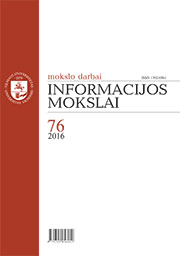Rusijos propagandos praktika daro įtaką teoriniam komunikacijos modeliui
Russian propaganda practice affects the theoretical model of communication
Author(s): Andrius VaišnysSubject(s): Government/Political systems, Security and defense, Politics and communication, Theory of Communication, Transformation Period (1990 - 2010), Present Times (2010 - today)
Published by: Vilniaus Universiteto Leidykla
Keywords: communication model; the Russian political war; propaganda; information space;
Summary/Abstract: The author examines how intensive Russian propaganda (both recognisable and unrecognisable) can expand any theoretical model of communication. Over the past 15 years, in the context of open military and democratic conflicts where Russia fights against Ukraine and over Ukraine, or over influence in the Middle East by bombarding Syrian cities, and where the European Union is breaking apart after the Brexit vote, informational politics has emerged as one of the most significant factors. The author claims that the National Security Concept of the Russian Federation, adopted in 2000, served as a stimulus to the current expansion of the official propaganda of Russia. The document in question has to be described as the start of Russian politics built on disinformation. The concept claims that, allegedly, Russia is threatened by the other nations’ desire “to dominate on the global information space” and “push Russia out of the international and domestic information market”; the concept further claims that foreign states are supposedly developing “the concepts of information warfare that provide for measures of dangerous impact on the information areas of other nations around the world”. If one wished to apply a communication model to the document in question, one would have to opt for the simplest, i.e. linear (sender – message – recipient), model as there is no data implying that anyone had interpreted the content of the document as a set of symbols of inverted meaning, or had anticipated that Russia will itself start constructing information operations to justify its propagandistic politics. 25 Russia embarked on the path of political warfare at the beginning of the 21st century, reclaiming its role of an influentialstate, though in places where it is unable to exercise direct censorship of the media yet can make use of the activities of foreign authorities and organisations, or discussions in the social media, it breaks down the relationships as opposed to building them. After a review of research papers on propaganda by various authors one is forced to agree that the most effective way to recognise Russian propaganda would be the application of the communication model developed by Garth S. Jowett and Victoria J. O’Donnell; however, as claimed by the author, if one was to look for propaganda organization, as suggested by Jowett and O’Donnell, one would be mistaken in their hopes to find just one (contrary to the political system of the former Soviet Union when all media was “directed” by the Communist Party divisions at the appropriate structural level by territorial units and party leadership levels). Seeing that in this age Russian politics have turned into the instigation of a physical war (in the case of Ukraine) and its propaganda, one has to bear in mind that information operations that turn into propaganda messages and information warfare are carried out by various governmental institutions, municipalities and so called non-governmental organisations domestically and abroad. Consequently, a “systematic attempt to shape perceptions, manipulate cognitions, and direct behaviour” is not a sufficient characteristic to describe Russia’s actions: by describing the phenomenon as an “attempt” one implies that propaganda, even though systematic, is just a short-term “creative exercise”. The author concludes that Russian propaganda is an institutionalised form of state informational politics aimed to expand information spaces globally and to maintain informational influence in shaping a persuasive opinion justifying Russia’s claims and predatory actions. Here information space is understood as a coverage beyond national borders where audiences have the technical means to accept and do accept messages transmitted over various channels. It also denotes informational state of the country: if, due to cultural or economic circumstances, there are factors in a society that make it possible to accept both useful and harmful (misleading) messages, these can be used to expand the information space. Over the period of 15 years Russia has developed political warfare by turning propaganda into a form and a tool of state politics. Stages of Russian political warfare (2000–2015): the development of guidelines and opinion control domestically (I); propaganda expansion (II); and information warfare on the global information space (III). The author believes that Russian propaganda techniques modify the theoretical model of communication: the key role is played not by the “sender” in general, but by the organiser and the roles of both the sender and recipient may be switched at organiser’s will; the role of the organiser itself is hidden. The switching of these roles is a method of Russian propaganda: those Western audiences that respect democratic values and get information prepared in their language (content consistent with their concepts) may get involved as participants on the Russian information space (while being recipients they may, in fact, be turned into information senders).The “anti-American” sentiment is one of the particulars of the criticism of democracy (not just a political theory) that is used to switch the participants of the communication process.
Journal: Informacijos mokslai
- Issue Year: 2016
- Issue No: 76
- Page Range: 7-25
- Page Count: 19
- Language: Lithuanian

